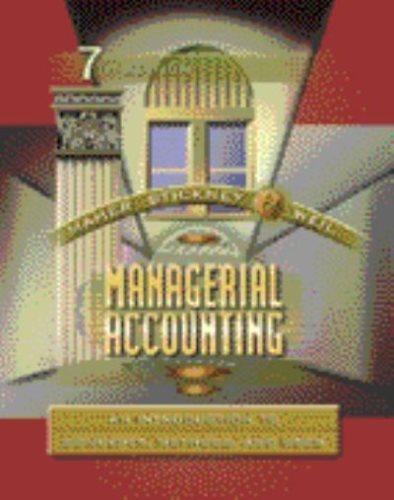Distortions caused by inappropriate overhead allocation base. Chocolate Bars, Inc. (CBI), manufactures creamy deluxe chocolate candy bars.
Question:
Distortions caused by inappropriate overhead allocation base." Chocolate Bars, Inc. (CBI), manufactures creamy deluxe chocolate candy bars. The firm has developed three distinct products: Almond Dream, Krispy Krackle, and Creamy Crunch.
CBI is profitable, but management is quite concerned about the profitability of each product and the product costing methods currently employed. In particular, management questions whether the overhead allocation base of direct labor-hours accurately reflects the costs incurred during the production process of each product.
In reviewing cost reports with the marketing manager, cost accountant Steve Hoffman notices that Creamy Crunch appears exceptionally profitable while Almond Dream appears to be produced at a loss. This surprises both Steve and the manager, and after much discussion, they are convinced that the cost accounting system is at fault and that Almond Dream is performing very well at the current market price.
Steve decides to hire Jean Sharpe, a management consultant, to study the firm's cost system over the next month and present her findings and recommendations to senior management. Her objective is to identify and demonstrate how the cost accounting system might be distorting the firm's product costs.
Jean begins her study by gathering information and documenting the existing cost accounting system. It is rather simplistic, using a single overhead allocation base, direct labor-hours, to calculate and apply overhead rates to all products. The rate is calculated bys umming variable and fixed overhead costs and then dividing the result by the number of direct labor-hours. The product cost is determined by multiplying the number of direct labor-hours required to manufacture the product by the overhead rate and adding this amount to the direct labor and direct material costs.
CBI engages in two distinct production processes for each product. Process 1 is labor intensive, using a high proportion of direct materials and labor. Process 2 uses special packing equipment that wraps each individual candy bar and then packs it into a box of 24 bars. The boxes are then packaged into cases of six boxes. Special packing equipment is used on all three products and has a monthly capacity of 3,000 boxes, each containing 144 candy bars.
To illustrate the source of the distortions to senior management, Jean collects the cost data for the three products. Almond Dream, Krispy Krackle, and Creamy Crunch
(see Exhibit 4.1 1 ).
CBI recently adopted a general policy of discontinuing all products whose gross profit margin ([Gross margin/Selling pricel X 100) percentages were less than 10 percent. By comparing the selling prices to the firm's costs and then calculating the gross margin percentages, Jean could determine which products, under the current cost system, should be dropped. The current selling prices of Almond Dream, Krispy Krackle, and Creamy Crunch are $85, $55, and $35 per case, respectively.
a. Complete Exhibit 4.1 1 under the current cost system and determine which produces), ifa ny, should he dropped.
b. What characteristic of the product that should he dropped makes it appear relatively unprofitable?
c. Calculate the gross profit margin percentage for the remaining products. Assume that CBI can sell all products it manufactures and that it will use the excess capacity from dropping a product to produce more of the most profitable product. If CBI maintains its current rule about dropping products, which additional products, if a ny, should CBI drop under the existing cost system? Overhead will remain $69,500 per month under all alternatives.
d. Recalculate the gross profit margin percentage for the remaining product(s) and ascertain whether any additional produces ) s hould be dropped.
e. Discuss the outcome and any recommendations you might make to management regarding the current cost system and decision policies.
Step by Step Answer:

Managerial Accounting An Introduction To Concepts Methods And Uses
ISBN: 9780030259630
7th Edition
Authors: Michael W. Maher, Clyde P. Stickney, Roman L. Weil, Sidney Davidson





